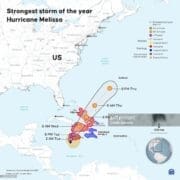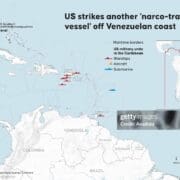News Americas, New York, Fri. Oct. 17, 2025: With over 27 people now dead from unilateral U.S. military strikes in Caribbean waters near Venezuela, human rights organizations are accusing the Trump administration of murder.
An infographic titled “US strikes another ‘narco-trafficking vessel’ off Venezuelan coast” created in Ankara, Turkiye on October 15, 2025. US President Donald Trump said the US carried out another strike Tuesday on ‘a narco-trafficking vessel’ off the coast of Venezuela. (Photo by Yasin Demirci/Anadolu via Getty Images)
“All available evidence suggests that President Trump’s lethal strikes in the Caribbean constitute murder, pure and simple,” said Jeffrey Stein, staff attorney with the ACLU’s National Security Project. “The public deserves to know how our government is justifying these attacks as lawful, and, given the stakes, immediate public scrutiny of its apparently radical theories is imperative.”
On October 15, the Center for Constitutional Rights and the American Civil Liberties Union filed a Freedom of Information Act, (FOIA) request seeking the Justice Department’s Office of Legal Counsel, (OLC) opinion authorizing these strikes. The groups argue that the U.S. has crossed a dangerous legal and moral line by targeting unarmed civilians under the guise of anti-narcotics operations.
Lethal Strikes Under “Counter-Narcotics” Cover
Since early September, the U.S. has launched repeated airstrikes against private vessels it claims were drug-smuggling boats operating in international Caribbean waters. The strikes – now totaling at least six – are part of a new Joint Task Force, (JTF), initiative under the U.S. Southern Command, (SOUTHCOM), which aims to “synchronize and augment counter-narcotics efforts” across the Western Hemisphere.
The JTF, led by the II Marine Expeditionary Force, integrates military, intelligence, and Homeland Security resources, expanding aerial and maritime surveillance, real-time intelligence sharing, and rapid-response capabilities. The Trump administration claims these measures are essential to dismantling narcotrafficking networks it now labels as “terrorist non-state armed groups.”
However, legal scholars say the administration’s reclassification of narcotics cartels as “terrorists” stretches the limits of both domestic and international law, effectively treating criminal suspects as combatants.
Legal Ambiguity and Public Outrage
During recent Senate hearings, Attorney General Pam Bondi declined to confirm the existence of legal guidance authorizing such strikes. But Charles Young, nominated as U.S. Army general counsel, admitted that the OLC opinion exists, drafted by an interagency working group including White House and executive branch lawyers.
“This is an unprecedented expansion of presidential power,” said Baher Azmy, legal director of the Center for Constitutional Rights. “In a constitutional democracy, no president can arbitrarily choose to assassinate individuals from the sky based on his whim or say-so.”
Amnesty International condemned the attacks as “murder—plain and simple,” noting that the administration has provided “no plausible legal justification” for killing alleged drug smugglers without evidence or due process.
“This was the fifth U.S. strike in the Caribbean since early September, bringing the body count to 27,” said Daphne Eviatar, Amnesty International USA’s Director for Security and Human Rights. “These airstrikes outrageously flout international law and set a dangerous precedent for other leaders around the world.”
Military Fallout and Regional Alarm
Meanwhile, tensions are rising within the U.S. military itself. Defense Secretary Pete Hegseth announced that Admiral Alvin Holsey, who leads SOUTHCOM operations in Latin America, will step down two years early. Sources told Reuters that disagreements over the legality and escalation of Caribbean operations contributed to his decision.
Holsey’s resignation comes as the U.S. continues a military buildup near Venezuela, deploying guided missile destroyers, F-35 fighter jets, and a nuclear submarine. The administration insists these moves are necessary to counter “narcoterrorist threats,” though critics say they risk igniting a regional conflict.
Adding to concerns, Trump confirmed he has authorized CIA covert operations inside Venezuela, heightening fears of regime-change efforts against President Nicolás Maduro.
Collateral Damage and Human Cost
Boats are pictured on the shore of La Cueva Bay, north coast of Trinidad and Tobago, on October 16, 2025. Police in Trinidad and Tobago told AFP on October 16, 2025, they are investigating whether two citizens were among six people killed in a US strike on a boat allegedly transporting drugs from Venezuela after reports by residents of Las Cuevas village. (Photo by AFP) (Photo by STRINGER/AFP via Getty Images)
Among those killed in the fifth strike were two men from Trinidad and Tobago – Chad “Charpo” Joseph and Rishi Samaroo – whose families insist they were not involved in drug trafficking. “If you see a boat, you are supposed to stop and intercept it, not blow it up,” said Joseph’s aunt, Lynette Burnley, calling the attack “wickedness.”
To date, at least 28 people have been killed in the ongoing U.S. operation, which rights groups warn amounts to extrajudicial execution.
As the ACLU and CCR press for transparency, the question remains: can the U.S. justify these killings under international law – or is it rewriting the rules of engagement in its own image?
Ramotsamai Itumeleng Khunyeli contributed to this story.










